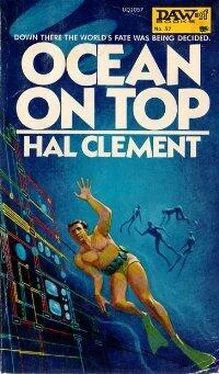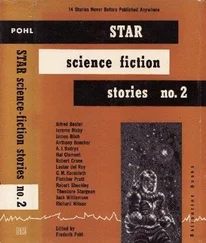Hal Clement - Ocean on Top
Здесь есть возможность читать онлайн «Hal Clement - Ocean on Top» весь текст электронной книги совершенно бесплатно (целиком полную версию без сокращений). В некоторых случаях можно слушать аудио, скачать через торрент в формате fb2 и присутствует краткое содержание. Год выпуска: 1973, Издательство: DAW Books, Жанр: Фантастика и фэнтези, на английском языке. Описание произведения, (предисловие) а так же отзывы посетителей доступны на портале библиотеки ЛибКат.
- Название:Ocean on Top
- Автор:
- Издательство:DAW Books
- Жанр:
- Год:1973
- ISBN:нет данных
- Рейтинг книги:5 / 5. Голосов: 1
-
Избранное:Добавить в избранное
- Отзывы:
-
Ваша оценка:
- 100
- 1
- 2
- 3
- 4
- 5
Ocean on Top: краткое содержание, описание и аннотация
Предлагаем к чтению аннотацию, описание, краткое содержание или предисловие (зависит от того, что написал сам автор книги «Ocean on Top»). Если вы не нашли необходимую информацию о книге — напишите в комментариях, мы постараемся отыскать её.
Ocean on Top — читать онлайн бесплатно полную книгу (весь текст) целиком
Ниже представлен текст книги, разбитый по страницам. Система сохранения места последней прочитанной страницы, позволяет с удобством читать онлайн бесплатно книгу «Ocean on Top», без необходимости каждый раз заново искать на чём Вы остановились. Поставьте закладку, и сможете в любой момент перейти на страницу, на которой закончили чтение.
Интервал:
Закладка:
The change must have been gradual, or I’d have spotted it within the small area I could see well. As it was, I overlooked it completely; suddenly I was on an area of rock sloping much more steeply than any I had traversed up to then. Before I knew it the tank had started a stately roll to the left; after I knew it, leg after leg poked out in that general direction proved useless.
It wasn’t like rolling downhill in a barrel; it was a slow and graceful motion. I could easily have stayed upright inside the tank if I’d chosen to concentrate on that problem instead of on the controls. For all the use I got out of the latter, I might as well have concentrated on comfort. Some of the legs may have slowed me a little, but none of them came close to putting a stop to the journey. I rolled helplessly into the lighted region and out onto the tent fabric. For several long seconds my report-making attention was divided almost equally between up and down.
Above me I could see the lights clearly for the first time. They were ordinary high-pressure, excited-vapor lamps, bigger than I’d ever seen used for general illumination, but otherwise nothing strange. I still couldn’t see what held them in position, since looking up at them was hard on the eyes.
Looking down was harder on the imagination, though mine was getting a bit calloused. I already knew that the fabric was remarkably strong and elastic; I’d seen how it reacted to Pugnoses’s bow, which must have had some pretty sharp corners here and there. I also knew that it was opaque, or at best translucent, in its normal state. I realised that the part now under my tank would be-stretched. But it hadn’t occurred to me that stretching the stuff would make it transparent.
Chapter Four
When I stopped moving, however, I could see ordinary sea bottom — rock similar to the stuff I had been rolling across — under me. For a moment I thought something must have stopped me short of the tent roof after all, but glances through several of the ports killed that notion. I was nearly fifty yards out on the thing, sunk into it for just about half of the diameter of the tank. From ports above that level I could see the lights above and the smooth fabric below; from the lower windows I could make out rock and occasional patches of silt on the bottom and a greenish-white, evenly glowing ceiling above — evidently the fabric, lighted from the other side. It was translucent, then; but the part of it stretched around the lower half of the tank offered no interference at all to vision. Some of the legs were extended on this side, and the stuff seemed to have spread in an invisibly thin layer over these as well — they could hardly have punctured it or I wouldn’t have been hanging on the roof. Someone must have done some very fancy work in molecular architecture, I decided — which shows how a wildly wrong set of premises can at times give rise to a correct conclusion.
But why the tent at all? The sea bottom under it looked no different from that above. There was no sign of any human being or artificial structure in the region below. There weren’t even any living beings that I could see, and I certainly looked hard — it occurred to me for a moment that someone might have gone so far with the energy-wasting business as to try growing natural foods with artificial light. The idea at least went along with indifference to ordinary morality about energy; people who’d shine all those kilowatts into the ocean probably wouldn’t boggle at overreaching their fair share of area in order to grow mustard or something like that. The sea bottom was about the only place on Earth where such a trick could be pulled without being caught right away by indignant neighbors, to say nothing of the Board. The only trouble with the theory, other than one’s natural reluctance to believe in such people, was that I couldn’t see anything growing. For that matter, I didn’t know what sort of food plant could be grown under sea water. There were some, no doubt; and if there weren’t natural ones, there is always gene tailoring.
A more immediate question was what to do next. Thirty seconds of trying proved that I could extend and retract my legs until the power cells ran down without moving the tank at all. They just didn’t have anything to push against; the bottom was a little too far down. I tried rolling the thing by shifting my weight. This worked as far as turning the tank over was concerned, but didn’t get me noticeably closer to ‘shore’. It seemed that the only freedom of motion I had left was upward.
This was a little annoying. I had planned to plant a small sonar transponder near the entrance when I found it, as a guide for the police boats. If I dropped it here, it would mean very little and furthermore would be seen lying on the tent fabric by the first person who happened to pass, either above or below. If I’d had the reaction time and foresight of a fictional hero I might have let one go when I realized I was out of control; but I hadn’t, and there was no use moaning about it.
I might wait until they found the tank and just hope for a chance to drop the instrument without anyone’s noticing while they were carting me off, but that seemed to involve a historical record for optimism.
I couldn’t accept the idea of going back to the surface without leaving it, though, even though that and all the other things it would be so nice to get done seemed to be impossible. Even a snake on a tray of oiled ball bearings keeps wriggling.
And so I remained. There was really no point in an early departure anyway. I still had plenty of oxygen, and there was always the hope that I’d get a useful idea before they — whoever ‘they’ were — found me. The hope lasted for nearly six hours.
It wasn’t a girl this time, though it might possibly have been one of the same men. He wore the same sort of swimming outfit to the last detail, as far as I could see. He was swimming straight toward me when I first saw him, above the tent roof as the others had been, slanting out of the darkness from the direction I supposed the entrance must lie. Certainly he had seen me, or rather the tank. I wished I had spotted him earlier — it would be interesting, and might even be useful, to know whether I had been found accidentally by a passing swimmer or by someone deliberately checking the region where the wrecked boat had been found. However, I could be philosophical about not knowing. I watched as he swam overhead.
He should be able to recognize the tank without much trouble. It had a lot of nonstandard equipment fastened outside, but it was basically a regular emergency high-pressure escape tank of the sort you’d find in any large submarine — a sphere of silica fiber and high-stress polymer able to stand the pressure of two miles of sea water. It was light enough to float, ordinarily, but the jury-rigged thing I was in was well ballasted. Besides the legs and their accessory gear there were the lights, the transponders, sundry pieces of sensing equipment, and several slabs of lead so distributed as to keep the center of buoyancy and the geometrical center as close together as practical. The lead made the real difference; I would still float with all the rest.
The swimmer stopped stroking as he glided overhead and drifted, settling slowly toward me. I could see his face now through the helmet — in fact, the helmet itself was barely noticeable; he might almost have been swimming bareheaded. He was no one I could remember ever having seen before in five years, of Board work, but I took good note of the line of his black hair, the set of his eyes, and the squarish outline of the rest of his face so as to be sure of knowing him again if the chance ever came up. Presumably he couldn’t see me; the view ports were small, my inside lights were out, and he showed no sign of the surprise I would have expected him to feel if he knew or guessed that the tank contained a living man.
Читать дальшеИнтервал:
Закладка:
Похожие книги на «Ocean on Top»
Представляем Вашему вниманию похожие книги на «Ocean on Top» списком для выбора. Мы отобрали схожую по названию и смыслу литературу в надежде предоставить читателям больше вариантов отыскать новые, интересные, ещё непрочитанные произведения.
Обсуждение, отзывы о книге «Ocean on Top» и просто собственные мнения читателей. Оставьте ваши комментарии, напишите, что Вы думаете о произведении, его смысле или главных героях. Укажите что конкретно понравилось, а что нет, и почему Вы так считаете.












